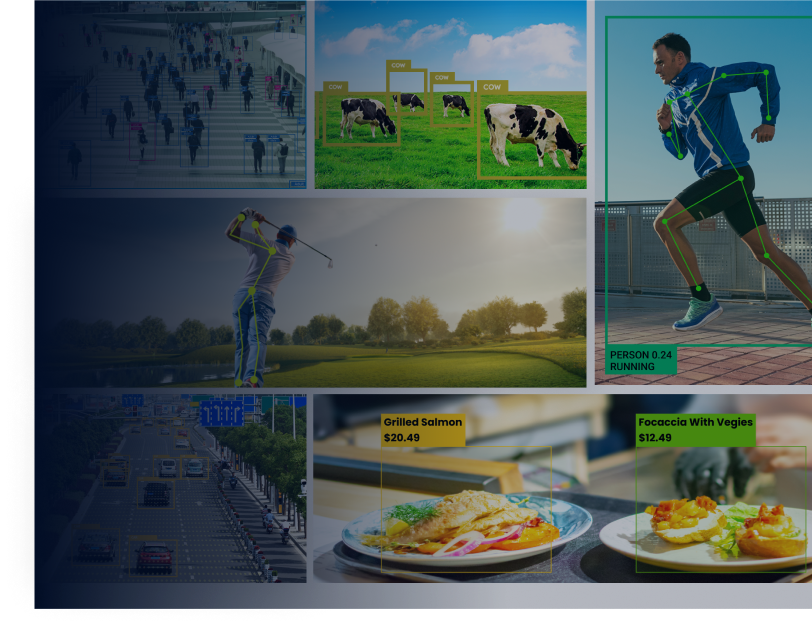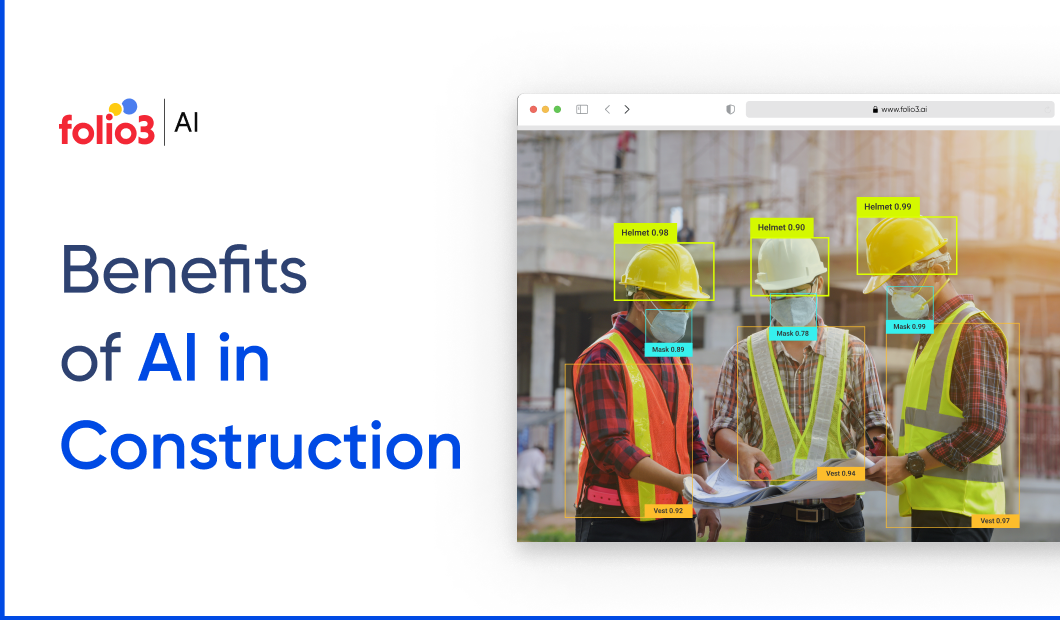Introduction
A revolution in the production industry is developing rapidly., AI is profoundly transforming manufacturing, improving workflows and safety. As the industry faces increasing demands for efficiency, quality, and sustainability, AI provides robust solutions that address these challenges and emerging opportunities.
This blog will explore the benefits of AI in construction, including how it drives innovation, reduces costs, and increases safety and quality. It will also showcase every step of a construction project. Stay tuned and grab a cup of coffee to gain valuable insights into AI.

The Future of Manufacturing
Artificial intelligence is not futuristic but a reality in today’s manufacturing. AI refers to systems and algorithms that can imitate human intelligence. Learn from data, make predictions, and solve complex problems. AI in construction is a game changer. It provides tools that help improve project planning, execution, and maintenance.
The impact of AI extends beyond efficiency—driving AI innovation in manufacturing and construction enables professionals to analyze vast amounts of data in real-time. Increasing efficiency in resource allocation and improving safety measures, automating routine tasks, and delivering predictive insights, AI helps teams focus on strategic decisions. This will ultimately change the way the industry operates works.
According to McKinsey, AI could increase productivity in the construction industry by 14% by 2030
But how does AI achieve this goal? Let’s examine the benefits of AI in construction and explore how it is transforming the industry.
10 Benefits of AI in Construction
Improved Project Planning
Accurate Forecasts with AI
The role of AI in project planning is invaluable. Traditional planning methods often rely on manual data entry, which can lead to inaccuracies and delays. AI is changing the game by using predictive algorithms to analyze data from previous projects, such as labor trends, weather, and supply chain logistics. These insights help create highly accurate project timelines and resource allocation plans.
AI’s ability to process vast amounts of historical data ensures more reliable and precise project forecasts. By eliminating manual errors and offering data-driven predictions, AI enables better decision-making, resulting in smoother project execution and timely completions.
Building information modeling (BIM)
A key AI tool in project planning is building information modeling (BIM), which helps teams visualize every aspect of a project in 3D. This technology helps ensure that designs are accurate and feasible, reducing costly errors. AI can also simulate potential challenges, such as procurement delays or labor shortages,, and adjust the plan accordingly.
BIM, enhanced by AI, provides a comprehensive view of the project. This allows for the rapid detection of design flaws and logistical challenges. This proactive approach reduces costly errors, improves project execution, and ensures a smoother path from idea to completion.
According to PwC’s Future of Construction report, AI-powered project planning can reduce project duration by up to 20%.
Improve security at the site
Real-time threat detection
Safety is a top priority in construction, and AI is helping reduce risks on the job site. These devices use computer vision to detect physical conditions such as fatigue, temperature, and movement.
AI-Powered Drones for Site Monitoring
To alert employees to potential dangers, AI-powered drones for job site surveillance are equipped with AI technology to inspect construction sites from above. It identifies hazards such as unstable scaffolding, exposed electrical wires, or unsafe working conditions. Real-time hazard monitoring allows teams to fix problems before accidents or injuries occur.
AI-powered drones help increase safety levels by continuously monitoring workplaces for potential hazards. This ensures proactive hazard identification. This technology not only improves safety in the workplace but also reduces downtime and costly accidents, leading to a safer and more productive environment.
Cost Optimization Optimizing
The Use Of Resources
Managing construction costs is a challenge. Especially with unpredictable material prices and labor shortages, AI optimizes resource allocation by more accurately predicting demand and offers cost-effective options by analyzing data from previous projects.
AI helps companies Forecast material usage, labor costs, and equipment needs. To ensure that the budget is met without compromising on quality.
AI-powered resource management ensures that every aspect of the project is carefully planned, reducing waste and improving budget control. By improving resource allocation, construction companies can maximize efficiency and deliver projects on time and within budget.
Waste Reduction And Material Efficiency
Material waste is a significant problem for construction projects in terms of environmental impact and cost. AI can help reduce waste by providing more accurate material quantity estimates by using AI to track material usage in real-time.
Production teams can adjust purchasing strategies and reduce over-ordering. Resulting in wasting fewer resources.: AI-powered cost management systems have been shown to reduce project costs by up to 15% by optimizing resource allocation and eliminating inefficiencies.
Make Faster Decisions
Real-time Insights In Construction
Decisions often need to be made quickly to avoid delays. AI tools provide real-time insights into project aspects such as labor productivity, material inventory, and equipment performance. With these data-driven insights, managers can make decisions quickly.
Predictive Analytics for Proactive Decisions
They can be assured that the project will proceed according to planned predictive analytics for proactive decision-making. AI’s ability to predict potential problems, related to supply chain disruptions or labor shortages helps project managers make proactive decisions. Rather than reacting to problems after they occur, AI allows decision-makers to plan and reduce risk.
AI-powered predictive analytics gives project managers the foresight to address challenges before they escalate. This ensures that the project runs smoothly. By reducing risk and proactively planning, AI increases efficiency and helps keep projects on track.
According to Accenture, AI-based decision support tools can speed up the decision-making process by 30-50%.
Increase Productivity
Automation Of Duplicate Tasks
AI is important in increasing productivity by automating repetitive and labor-intensive tasks. AI-powered robots can handle functions like laying bricks, digging, and pouring concrete. These tasks, which are generally time-consuming and labor-intensive, can be completed faster and more accurately with the help of AI.
AI Labor Management
In addition to physical work, AI can also help manage labor efficiency. AI tools can optimize shift schedules, assign employees based on skill sets, and monitor performance levels. This helps ensure the efficient use of labor and timely completion of work.
Accenture estimates that AI and automation can improve productivity by up to 30%.
Higher Quality Precision
Reducing Human Error
Human error can be costly in construction, causing rework, delays, and safety hazards. AI dramatically reduces the likelihood of such errors by providing accurate calculations, measurements, and simulations. Integrated stations of drones, and other AI-powered tools ensure that the job is completed with precision.
Reduce Design And Execution Errors
Advanced design precision AI also increases the accuracy of designs before construction begins. Conventional design algorithms can use AI to create building designs tailored to specific performance criteria. To ensure efficiency and efficiency.
AI-powered quality control can reduce rework costs by up to 40%,improvingoverall project quality.

Energy Efficiency And Sustainability
AI in Environmentally Friendly Construction
As sustainability becomes a key focus of the construction industry, AI will play a key role in promoting energy efficiency and reducing waste. AI algorithms analyze energy usage patterns and help optimize building systems such as HVAC and lighting for maximum efficiency.
Sustainable Material Selection
AI also supports sustainability by identifying the most environmentally friendly construction materials. It analyzes materials’ lifecycle impacts, taking into account factors such as energy use, greenhouse gas emissions, and waste, helping manufacturers make sustainable choices from the start.
AI solutions can reduce energy consumption in buildings by 15-25%, promoting sustainability in construction.
By leveraging AI to select sustainable materials, construction businesses can reduce their environmental impact while maintaining efficiency and quality. This proactive approach benefits the planet and aligns with evolving industry standards and customer expectations for environmentally friendly manufacturing practices.
Predictive Maintenance
Check Device Health
Construction projects require heavy machinery and may cause significant downtime delays. AI-powered predictive maintenance tools monitor equipment in real-time. It analyzes sensor data to predict when machines are likely to break down. It helps teams schedule maintenance before things go wrong. It helps reduce unexpected downtime and maintenance costs.
Prolonging Equipment Lifespan
Extend the life of your equipment by predicting maintenance needs; AI extends the life of production equipment. Regular maintenance helps ensure that machines will operate efficiently for longer. It helps companies save money on repairs and replacements. AI-powered predictive maintenance can reduce equipment downtime by 50%, resulting in better resource utilization.
Streamlined Supply Chain Management
AI Material Purchasing
AI optimizes the manufacturing supply chain by predicting material needs based on project schedules and historical data. AI tools can also evaluate supplier performance. This ensures that high-quality materials can be delivered on time. This leads to fewer delays, lower costs, and a more efficient procurement process. To reduce shortages and delays
Minimizing Shortages and Delays
AI tools can detect risks in the supply chain, such as potential delays or material shortages. This allows for proactive action to avoid disruption, improve project flow, and help meet deadlines without sacrificing quality.
AI solutions can reduce supply chain costs in the construction industry by 10-15%.
Increase Cooperation
Real-time Data Sharing
AI improves collaboration by integrating data across teams and platforms. Designers, engineers, and contractors can receive real-time project updates. AI tools improve communication to ensure everyone is aligned and working toward the same goal. Make collaboration smoother and more efficient.
By enabling information sharing and seamless communication, AI promotes a collaborative environment where teams work together and remain productive. With real-time insights and streamlined processes, AI helps ensure projects stay on track, reduce delays, and improve overall productivity.
Improved Project Monitoring
AI-powered collaboration tools provide extensive progress tracking. They help teams keep track of milestones, budgets, and timelines., ensuring that potential problems are identified early on. And corrective action is taken immediately.
AI-enhanced collaboration tools can improve team performance by 25%, resulting in faster project completion.
Missing how Folio3 AI can help Your Construction Business Adopt AI?
How can Folio3 AI revolutionize your manufacturing business? At Folio3, we specialize in providing customized AI solutions that improve your operations and drive efficiency. From predictive analytics to better project planning and AI-powered tools for real-time monitoring and resource optimization, our expertise helps us stay ahead of the curve.
Focused on increasing safety, reducing costs, and improving decision-making, Folio3 AI helps your construction business deploy state-of-the-art technology. Partner with us smoothly to turn challenges into opportunities and achieve unparalleled growth.
Conclusion:
Construction is rapidly embracing AI as a tool for building a brighter future. From planning to execution, the impact is undeniable. The benefits of AI in construction are man. Those who adopt this technology will improve operational efficiency and help make the industry more sustainable and safer.
The future of construction will be brighter. More efficient and more sustainable AI is the key to unlocking this change. As we harness the power of AI, the construction industry will continue to evolve, becoming faster, safer, and more innovative than ever before.










